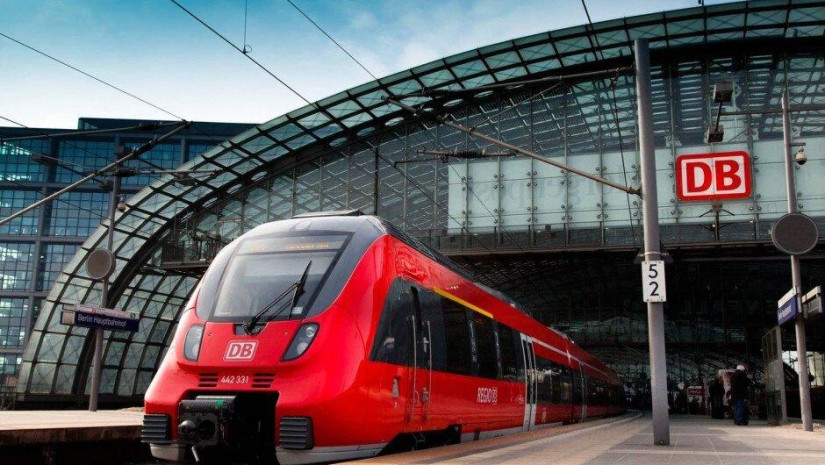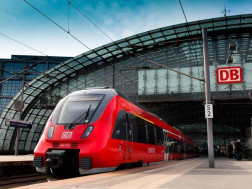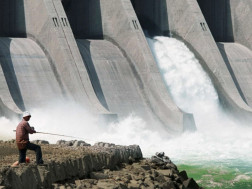It remains one of the most enduring cliches about Germany for those who don't live there: the trains run on time.
Except they don't, and haven't for quite some time. Last year, one-third of trains from Deutsche Bahn (DB) — Germany's state-owned rail company — were late. That figure has been steadily rising for years.
It's not just passengers who are affected. Some of Europe's biggest logistics companies have repeatedly called out DB's freight and cargo business in recent years for its persistent delays.
Tardiness is not the only problem. The company has been consistently posting losses in recent years and is currently more than €30 billion ($32.6 billion) in debt. Passengers routinely complain of overcrowded trains and expensive tickets.
The company has also been beset by industrial disputes. A 50-hour strike by railway workers, due to begin on May 14, was called off at the last minute the day before. EVG, the union behind the strike, says negotiations on wage increases are ongoing. Strikes in March and April already caused significant disruption.
The company itself has no illusions about the scale of the problem. "The current operational situation is not acceptable for us, travelers or railway companies," a DB spokesperson told DW.
What's the problem?
Jon Worth, a railway transport analyst resident in Berlin, says Germany's railways are in a "delicate situation." He says the main problem is widely acknowledged: a lack of investment in infrastructure.
"Railways in Germany are at the limit," he told DW. "Germany runs a lot of trains on very old and decrepit infrastructure and has simply not been investing in the tracks, the bridges and the signals as much as would be necessary in order to manage to run things with a stable and reliable service."
Karl-Peter Naumann, the honorary chairman of the public transport advocacy group PRO Bahn, agrees that outdated infrastructure is the main problem. "For customers, that means punctuality and, as a direct result, missed connecting trains," he told DW.
As well as infrastructure not being upgraded, much has been actively dismantled without being replaced. The total length of the railway network has been reduced by around 20% since 1994. The number of railroad switches, which enable trains to move from one track to another, was also significantly reduced.
Worth says this leads to another problem: namely that rail networks are filled to capacity. So when one train breaks down, it can create major ripple effects across the network.
DB concedes that a lack of infrastructure is the main problem. A company spokesperson told DW that years of "insufficient" funding, combined with a surge in passenger demand, have brought the company's problems to a head.
"The rail network can no longer cope," the spokesperson said. "In parts it is too old, too prone to failure and has too little capacity."
Who is to blame?
Responsibility for the lack of investment goes back a few decades, according to Worth. "Ultimately the problems stem from decisions made a good 20 years ago," he said. Baumann agrees: "Too little has been invested in the expansion and maintenance of the rail infrastructure in the last 30 years."
This March, Germany's Federal Court of Audit released a damning report that heavily criticized successive German governments and DB itself for what it referred to as the company's "permanent crisis."
It decried the company's financial situation, saying that its debt — which stands at more than €30 billion — had increased by an average of €5 million per day since 2016.
While the report was critical of the company, particularly the fact that DB's structure made it hard for the government to scrutinize and manage it properly, it emphasized that decisive government action was immediately needed to stop the problems spiraling out of control.
"Fundamental reforms are required to ensure that the railway system is able to meet its transport and climate policy role," Federal Court of Audit president Kay Scheller said.
What is being done and can it get better?
Amid all the criticism, DB and the government have taken steps to begin addressing these persistent problems. In March 2023, the government pledged to invest €45 billion in DB by 2027. Revitalizing and retrofitting the company's network is now a key plank of the government's plans to achieve climate neutrality by 2045.
"By 2030, a real high-performance network will be created," a DB spokesperson told DW.
Another initiative DB hopes will win favor is its recently launched €49 monthly ticket. The ticket, which costs €49 per month as the name suggests, will cover regional rail, metro, tram and bus networks nationwide, and is aimed at getting more people to use public transport.
Worth says DB is trying to upgrade its infrastructure, pointing to the wholesale renovation of the Frankfurt-Mannheim line as well as the purchase of a new fleet of high-speed ICE 3 Neo trains for long-distance travel.
DB has done "a reasonable job under very, very difficult circumstances," he said, specifically the lack of investment, its dire financial situation and the fact that passenger numbers have risen dramatically in the last few decades.
The company insists it is now turning a corner. It told DW it is rapidly upgrading its infrastructure on a daily basis, including detour routes to limit the hit to punctuality when main routes are disrupted.
It says that climate-friendly mobility is booming and that it expects a record number of long-distance travelers in 2023. "This spurs us on to become better for our customers as quickly as possible, because Germany deserves a railway that is more efficient and punctual," the spokesperson said, DW reports.
















